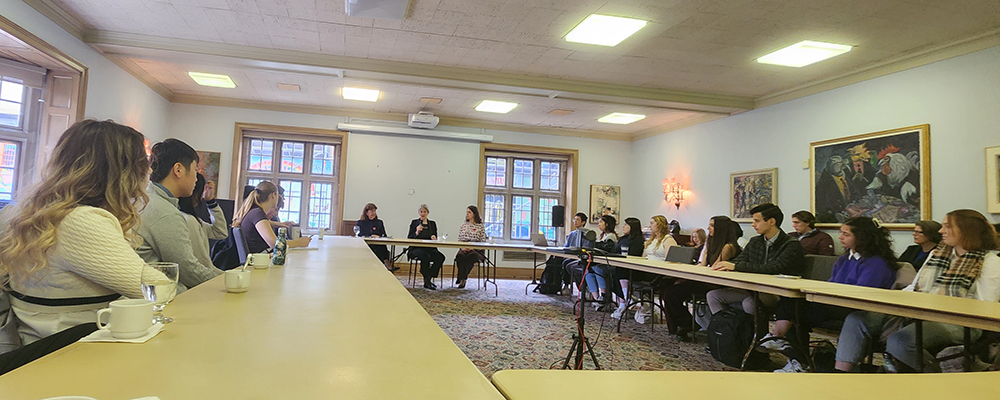A Conversation with Helen Clark, Former Prime Minister of New Zealand

Former Prime Minister of New Zealand Helen Clark at Trinity College for a conversation with students. Centre of image (left to right): Professor Rosemary McCarney, Prime Minister Helen Clark, and the International Relations Society President Anna Lysenko. Photo by Maria Acosta
Former Prime Minister of New Zealand Helen Clark visited Trinity College for a conversation with students from the Margaret MacMillan Trinity One and International Relations programs on November 7, 2023. Led by Professor Rosemary McCarney and the International Relations Society President Anna Lysenko, the conversation inspired students to reflect on the future they see for the world and included diverse issues including nuclear disarmament, non-proliferation, public health policy, pandemic preparedness, the United Nations (UN), climate change, the International Monetary Fund, the role of the United Nations and the influence of New Zealand, Canada, and other Western nations on international affairs.
In her remarks, former Prime Minister Clark highlighted the need to get back on track with nuclear disarmament. She noted the absence of Canada in those discussions at the international level despite possessing a similar stance against nuclear proliferation. She acknowledged that other countries in the Pacific likewise are not acting as a block. “Canada would be a welcome friend…like an old shoe: it fits but needs to be changed from time to time,” Prime Minister Clark said.
This lack of integrated response extended into other important issues like climate change, which faces similar challenges. Prime Minister Clark spoke with urgency that we are now seeing the effects of climate change around the world and countries like Tuvalu are facing cultural extinction as islands in the Pacific continue to sink.
Similarly, the world showed a lack of unity in the way in which COVID-19 and the threat of future pandemics were addressed. In her discussion, she stressed how future threats are inevitable due to the possibility of disease spillover from nature. Although these threats are currently dealt with by lower levels of governments (i.e. health ministries), they are actually national security threats that require more attention and support at the national level. Pointing to countries with better pandemic preparedness and recent experiences with other infectious diseases, such as South Korea and Singapore, as well as Central and West African nations, Prime Minister Clark emphasized that the claim that “no one was ready” for the pandemic is not supported and changes to address pandemic preparedness are urgently needed. She said that New Zealand had to make great sacrifices with their strong response to COVID-19. However, when lives were at stake, the economic cost of shutting off New Zealand from the rest of the world was seen as secondary in importance.
Prime Minister Clark also addressed the inequity in global health and shared her strong belief in the need to share intellectual property in times of crisis. Current negotiations in Geneva have given rise to conversations surrounding the role of first-world countries, the International Monetary Fund, the World Bank, ways to combat misinformation and distrust in institutions, as well as the possibility of a new Global Health Threats Council with rotating leadership. “During a [health crisis], all bets are off…intellectual property should be shared,” Prime Minister Clark said.
Addressing the topic of the United Nations – including its role, relevance, and effectiveness today – Prime Minister Clark discussed how the UN is more than just the Security Council, which is currently incapable of acting thanks to the veto power system. According to Prime Minister Clark, smaller UN agencies have done a lot of work and made use of their strong voices, and the General Assembly has stepped up but does not have the force of international law behind it. The UN was built to prevent another world war; and as such, it was not built to deal with the complex, multi-faceted, proxy conflicts of today. Although it has tried to adapt despite the circumstances, the perception of the UN as a “failure” has led to peacekeeping forces being pushed aside for private organizations like the Wagner Group, she explained. However, she continues to be a strong advocate of the UN and believes in a unified international response.
The Q&A portion of the event addressed the role of New Zealand in the current geopolitical climate, the future of the UN, decarbonization and COP26, Canadian health care for its indigenous population, as well as Israel and Palestine.
Prime Minister Clark’s overall message to students was a hopeful one: never despair. As a life-long passionate advocate for nuclear disarmament and public health policy, Prime Minister Clark encouraged students to continue the fight – her parting words sounded like a rallying cry.
We want to thank Prime Minister Clark for her time and congratulate her on receiving an honorary doctorate from the University of Toronto for her outstanding contribution to the public good and her commitment to a just, thriving, equitable and sustainable world.
Trinity College student Da Seul (Regina) Chong is the senior International Relations Stream Mentor in the Margaret MacMillan Trinity One Program and Leadership Team Member for the International Issues Discussion Series (IID). Regina is a third-year student, studying International Relations, Political Science, and Latin American Studies.
Categories: Academic; International Relations; Student News; Trinity One


